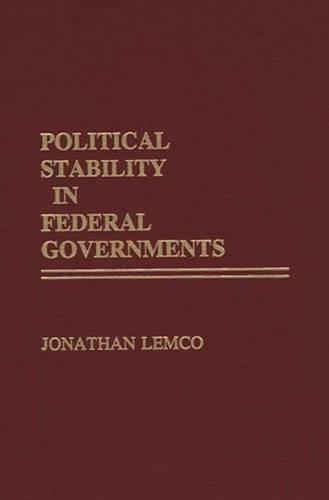
Political Stability in Federal Governments
(Hardback)
Publishing Details
Political Stability in Federal Governments
By (Author) Jonathan Lemco
Bloomsbury Publishing PLC
Praeger Publishers Inc
30th August 1991
United States
Classifications
Tertiary Education
Non Fiction
Central / national / federal government
Nationalism and nationalist ideologies and movements
321.02
Physical Properties
Hardback
224
Width 156mm, Height 235mm
539g
Description
Investigates those political, economic, and social conditions that theorists of federalism have associated with the stability or instability of federations. For many years, there have been pervasive arguments that federalism provides the best government possible for a nation of considerable ethnic and regional disparity. Students of federations have suggested that a centralized federal government that protects the national interest, and governments of the constituent units that protect local and regional interests, are the most responsive administrative forms for a society of great diversity. Following a review of the theoretical literature concerning federalism and political stability, data pertaining to political, social and economic conditions that are reputed to be related to federal political stability are collected and tested. These conditions include the structure of politics, the impact of political freedom, the importance of the party system and the relevance of ethnically and territorially based cleavages. The associations among economic mordernization, social mobilization, relative deprivation and federal political stability are also investigated. The author concludes with a discussion of the most significant independent variables, the prospects for future research and a focus on the extent to which federal and unitary structures can protect minority rights effectively. Lemco's study should be of interest to political theoreticians as well as to students of contemporary nationalist movements.
Reviews
"The federal constitutional structure," Lemco notes, "has become especially popular in this century." His book investigates various aspects of federal systems of government based on 44 federations formed over the past 200 years, 27 of which failed to stay together or turned into centralized unitary states. Federalism, he writes, is an "attractive but fragile constitutional form"--attractive because it seems to facilitate unity with diversity in political systems, and fragile because the diverse subnational units that comprise the federation frequently are not able to reconcile their differences satisfactorily enough to permit the federation to continue. Lemco's primary interest is in the stability of federal systems: which elements contribute to stability and which reduce stability He looks at structures, political freedoms, cleavages (race, religion, language), modernization, and economic prosperity of the constituent units and calculates the impact of dependent variables within each of these broad categories on the ongoing federation based on his sample of 44 federations. The sample includes as "ongoing federations" the USSR (since 1922) and Yugoslavia (since 1946). The USSR under Communist party rule claimed to be a federation, but was one only on paper and not in reality. Yugoslavia's 1974 constitution created a confederal system, providing vast decision-making authority to the constituent republics. With Tito's death (1980) and the collapse of the Communist party as a centralized political force soon thereafter, Yugoslavia by the mid-1980s was no longer operating as a federation. Footnotes; useful bibliography. Recommended for students (all levels) and general readers.-Choice
""The federal constitutional structure," Lemco notes, "has become especially popular in this century." His book investigates various aspects of federal systems of government based on 44 federations formed over the past 200 years, 27 of which failed to stay together or turned into centralized unitary states. Federalism, he writes, is an "attractive but fragile constitutional form"--attractive because it seems to facilitate unity with diversity in political systems, and fragile because the diverse subnational units that comprise the federation frequently are not able to reconcile their differences satisfactorily enough to permit the federation to continue. Lemco's primary interest is in the stability of federal systems: which elements contribute to stability and which reduce stability He looks at structures, political freedoms, cleavages (race, religion, language), modernization, and economic prosperity of the constituent units and calculates the impact of dependent variables within each of these broad categories on the ongoing federation based on his sample of 44 federations. The sample includes as "ongoing federations" the USSR (since 1922) and Yugoslavia (since 1946). The USSR under Communist party rule claimed to be a federation, but was one only on paper and not in reality. Yugoslavia's 1974 constitution created a confederal system, providing vast decision-making authority to the constituent republics. With Tito's death (1980) and the collapse of the Communist party as a centralized political force soon thereafter, Yugoslavia by the mid-1980s was no longer operating as a federation. Footnotes; useful bibliography. Recommended for students (all levels) and general readers."-Choice
Author Bio
JONATHAN LEMCO is Director of the Canadian-American Committee of the National Planning Association and Adjunct Professor at The Johns Hopkins University. He is the author of Canada and the Crisis in Central America (Praeger, 1991), State and Development, The-Energy Environment Tradeoff, and Many Different Tongues. He is also editor of and contributor to Energy and Environmental Concerns in Canada and the United States, Tensions at the Border: The Politics of Energy and Environmental Coordination in the Canada-United States Relationship (both forthcoming from Praeger) tional Health Care: Lessons for the United States and Canada, and Turmoil North of the Border: Quebec Nationalism and Its Implications for the United States.
